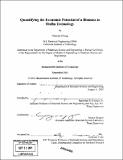| dc.contributor.advisor | Randolph E. Kirchain, Jr. and Jeremy Gregory. | en_US |
| dc.contributor.author | Chiang, Nicholas (Nicholas Kuang Hua) | en_US |
| dc.contributor.other | Massachusetts Institute of Technology. Dept. of Materials Science and Engineering. | en_US |
| dc.date.accessioned | 2006-07-31T15:18:19Z | |
| dc.date.available | 2006-07-31T15:18:19Z | |
| dc.date.copyright | 2004 | en_US |
| dc.date.issued | 2005 | en_US |
| dc.identifier.uri | http://hdl.handle.net/1721.1/33628 | |
| dc.description | Thesis (M. Eng.)--Massachusetts Institute of Technology, Dept. of Materials Science and Engineering, September 2005. | en_US |
| dc.description | Includes bibliographical references (leaves 39-40). | en_US |
| dc.description.abstract | Oil is one of the most valuable natural resources in the world. Any technology that could possibly be used to conserve oil is worth studying. Biomass waste to olefin (WTO) technology replaces the use of oil as a feedstock. WTO technology is actually a combination of two different processes: the waste to methanol (WTM) process and the methanol to olefins (MTO) process. However, WTO technology is still not commercially applied. Despite the environmentally beneficial advantages of biomass waste to olefins technology, the economic advantages or disadvantages still need to be explored further. This thesis tries to determine under what operating conditions (production volumes, feedstock prices, etc.) make the biomass waste to olefins technology most competitive. The WTM process is the economical limiting factor in the WTO technology. However, for relatively significant production volumes, the WTO technology is still competitive with a slight decrease in biomass feedstock price. | en_US |
| dc.description.statementofresponsibility | by Nicholas Chiang. | en_US |
| dc.format.extent | 40 leaves | en_US |
| dc.format.extent | 1722349 bytes | |
| dc.format.extent | 1723916 bytes | |
| dc.format.mimetype | application/pdf | |
| dc.format.mimetype | application/pdf | |
| dc.language.iso | eng | en_US |
| dc.publisher | Massachusetts Institute of Technology | en_US |
| dc.rights | M.I.T. theses are protected by copyright. They may be viewed from this source for any purpose, but reproduction or distribution in any format is prohibited without written permission. See provided URL for inquiries about permission. | en_US |
| dc.rights.uri | http://dspace.mit.edu/handle/1721.1/7582 | |
| dc.subject | Materials Science and Engineering. | en_US |
| dc.title | Quantifying the economic potential of a biomass to olefin technology | en_US |
| dc.type | Thesis | en_US |
| dc.description.degree | M.Eng. | en_US |
| dc.contributor.department | Massachusetts Institute of Technology. Department of Materials Science and Engineering | |
| dc.identifier.oclc | 64392425 | en_US |
